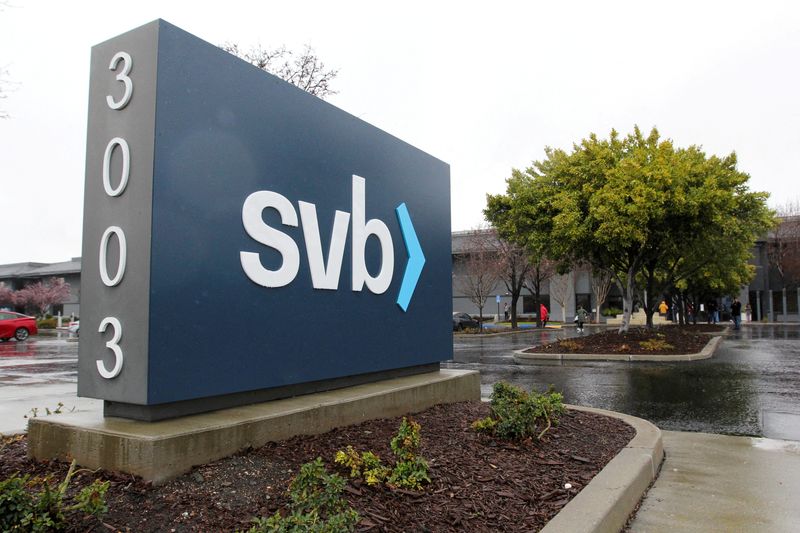By Pete Schroeder and Nupur Anand
WASHINGTON/NEW YORK (Reuters) - The rapid unraveling of SVB Financial Group has blindsided the banking industry after years of stability.
The collapse on Friday, the largest bank failure since the 2008 financial crisis, had a unique set of circumstances but raised questions about hidden weaknesses that could have consequences for customers and employees and potentially highlight issues in other banks.
SVB's plight could lead to a loss of confidence, tougher regulation and investor skepticism about the financial health of smaller banks that were seen as adequately capitalized after regulators forced banks to hold more capital in the aftermath of the 2008 crisis, experts said.
Sheila Bair, who headed the Federal Deposit Insurance Corp (FDIC) during the global financial crisis, said in an interview that bank watchdogs are likely now turning their attention to other banks that may have high amounts of uninsured deposits and unrealized losses, two factors that contributed to SVB's quick collapse.
“These banks that have large amounts of institutional uninsured money...that’s going to be hot money that runs if there’s a sign of trouble,” Bair said.
A sequence of events led to SVB's failure including it selling U.S. Treasuries to lock in funding costs due to expectations of higher rates, resulting in a loss of $1.8 billion. SVB, which did business as Silicon Valley Bank, also had 89% of its $175 billion in deposits uninsured as the end of 2022. The FDIC insures deposits up to $250,000.
Investors and customers now face a nervous wait to see if SVB bank finds a buyer quickly. During the 2008 financial crisis, Washington Mutual found a buyer immediately. But for IndyMac, in 2009, it took about eight months.
The speed of the SVB crash blindsided observers and stunned markets, wiping out more than $100 billion in market value for U.S. banks in two days.
"Banks are opaque, so immediately, we all go 'wait a minute, how interconnected is this bank to another one,'" said Mayra Rodríguez Valladares, a financial risk consultant who trains bankers and regulators. "Investors and depositors do not want to be the last ones turning out the lights in the room, so they have to leave."
TOUGHER RULES
Several experts said any ripple effects in the rest of the banking sector may be limited. Larger institutions have more diverse portfolios and deposit clientele than SVB did. SVB also had a high level of reliance on the startup sector.
"We do not believe there is contagion risk for the rest of the banking sector," said David Trainer, CEO of New Constructs an investment research firm. "The deposit base from the major banks is much more diversified than SVB and the big banks are in good financial health."
Jason Ware, chief investment officer for Albion Financial Group, said linkages to the overall banking system are limited but "this situation has perhaps implications for select regional banks with some direct exposure."
Other experts said the failure could bolster efforts by U.S. regulators to tighten rules.
The banking sector steered through the COVID-19 pandemic, thanks in part to tougher rules put in place following 2008. However, during President Donald Trump’s administration, some rules were eased.
Those easier rules for regional banks are likely to come under greater scrutiny as watchdogs look to ensure they too have enough cushion to weather similar stresses, some regulatory and industry sources said.
Senator Elizabeth Warren, a prominent bank critic, tweeted that the bank's failure "underscores the need for strong rules to protect the financial system."
One area of particular focus could be larger regional banks, which saw some rule relief under the Trump administration. U.S. banking regulators said in October they were considering new requirements on large regional banks, including holding more long-term debt to weather losses.
"It does feel like the first place that the market is going to look is to regional banks that don't have loan diversification," said Greg Hertrich, head of U.S. depository strategies at Nomura.
Another requirement that could garner more attention, industry sources said, was expanding which banks are required to account for the market value of held securities. That requirement currently only applies to banks with over $250 billion in assets, but could grow to include other firms.

On Monday, FDIC Chairman Martin Gruenberg warned bankers gathered in Washington that firms are facing higher levels of unrealized losses, as rapid interest rate increases have driven down the value of longer-term securities.
“The good news about this issue is that banks are generally in a strong financial condition... On the other hand, unrealized losses weaken a bank’s future ability to meet unexpected liquidity needs,” said Gruenberg, three days before SVB announced its need to raise funds. (This story has been corrected to change the year of financial crisis to 2008 in paragraph 2)